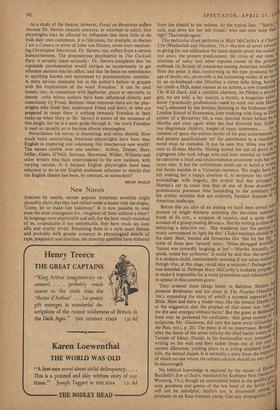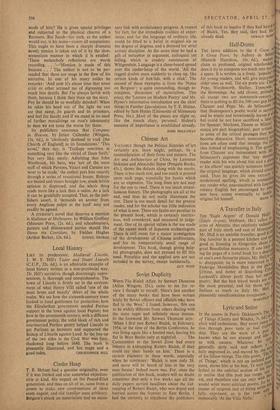New Novels
JUDGING by results, certain popular American novelists might plausibly claim that they had rallied under a leader with the slogan, 'Come, let us make lust ludicrous!' Is it now possible to read even the most courageous (i.e., toughest) of them without a titter? In language once unprintable and still, for the least mealy-mouthed of us, unspeakable if not unthinkable, they have made sex look silly and cruelty trivial. Emulating them in a style more literate and probably with greater accuracy in physiological details of rape, pregnancy and abortion, the minority novelists have slithered from the absurd to the tedious. At the typical line, ' "Sorry:. b said, and dove for her left breast,' who can now keep bag sigh? That strain again !
This particular diver performs in Mary McCarthy's A Chat"! Life (Weidenfeld and Nicolson, 15s.)—the sort of novel advert as giving for our edification the latest reports about the inainise Pi , nos fours. the present predicament, the crisis of our time, l' dilemma of today and other reputed causes of the prolong, outbreak (in fiction) of crapulence among American intellectli Here the point is that, conforming to the type produced by tiij age of doubt, etc., an ex-wife is the consenting victim of an ass° by an ex-husband—she (Martha) a clever little thing, having! her credit a PhD, some success as an actress, a new translation The Wild Duck, and a youthful abortion; he (Miles) a psycho' gist, we are told, a lay analyst, a mystic, a magazine editor, boxer ('practically professional—used to work out with Herilin' way'), educated by the Jesuists, finishing at the Sorbonne and ,I London School of Economics, later studying with Jung at ZOlic author of a Broadway hit, a man married thrice before he Inc• Martha and once again when she had divorced him, father ti two illegitimate children, keeper of many mistresses. . . . In ti interests of space the solemn recital of his past achievernents, and present qualifications 'on' for admittance to a standaralsy novel must be curtailed. It can be seen that Miles was just ,te man to ill-treat Martha. Having turned her out of doors in ",,, nightgown (she took refuge with and later married an historian' he. contrives a brief and unceremonious encounter with her sev,, years later. It has the unfortunate result apt to befall a wrong but fertile maiden in a Victorian romance. We might have ber. left wishing her a happy abortion if, to terminate the untli proceedings with tragedy, the author had not arranged aj Martha's car to crash into that of one of those drunken °,d promiscuous poetesses who (according to the novelists) OA the artistic colonies that are evidently familiar features of ' American landscape. Before this pis alter of an ending we have been served WITI: , portion of bright bitchery satirising the too-often satirise touch of lit. crit., a soupcon of squalor, and a quite ena1,1$, account of a group reading Berenice. But the writing is often slab betraying a defective ear : 'She wandered into the parlour 80 wanly commenced to light the fire.' Cliché-watchers should b,e04 the alert. Here, besides old favourites like 'She bit her lip, y some of those new 'inward' ones: 'Miles shrugged inwardlY 0 'Sinnot was inwardly laughing at her'—`Martha inwardly, s°t.
,
speak, raised her eyebrows.' It could be said that the novel 1:s
,,,
is a modern cliché, intermittently amusing if not taken seriously though who, at this stage, could take is seriously? Perhaps rt° was intended to. Perhaps Mary McCarthy's laudable purposed to make it impossible for a more pretentious and ridiculous a to appear in this common genre.
AO They ordered these things better in, Babylon. Sholern 4
presents Belshazzar and his court in The Prophet (Macci°r11)‘ 16s.), expanding the story of which a synopsis appeared jad Bible. Here and there a reader may, like the present Daniel, irip at the suggestion that the prophet of that name was 'cast all the fire and emerged without harm.' But the guest at Belshald feast may be pardoned his confusion : that great student .° , i scriptures, Mr. Gladstone, fell into the same error (G/eanitligifs e: the Past, vol i, p. 26). The point is of no importance. Broug ;di after the dance of the seven veils by the chief harlot votary °.!. tit Temple of Ishtar, Daniel, in his businesslike way, interprets., i writing on the wall and then rather drops out of this st070( ancient dilemmas, yielding place to a young shepherd /Olio( hills, the second Isaiah. It is certainly a story from the ettlacoue of which no one whom the subject attracts should on anY ac
be discouraged. „ccat4,
No biblical knowledge is required by the reader of l'i r anJ Bacchelli's Son of Stalin, translated by Kathleen Nott (Secke real'
i
Warburg, 15s.), though an untarnished belief in the godlikeLgjoid ness, goodness and genius of the late head of the Soviet tli will not be unhelpful. Stalin's son is discovered among If prisoners in an East German camp. Can any propaganda
made of him? He is given special privileges and subjected to the physical charms of a Baroness. But Jacob—for such, as the author would say, is his name—resists all temptations. This ought to have been a sharply dramatic novel; tension is taken out of it by the slow, sententious manner in which it is exuded:
`These melancholy reflections are worth recording. . . .'—'Mention is made of this because . . : The author is not to be per-
suaded that these are snags in the flow of his narrative. In one of his many asides he
remarks: `And now it's about time that some critic or other accused me of digressing too much into details. But I'm always lavish with them, because I think they liven up the story.' Pity he should be so woefully deluded! When he takes his head out of the light we can see that camp, its guards and its prisoners, and feel for Jacob; and if we stand in no need of further moralisings on man's inhumanity to man we are none the worse for them.
Its publishers announce that Company in Heaven, by Julian Callendar (Wingate, 13s. 6d.), is `obviously destined to rock [the Church of England] to its foundations.' This novel,' they say, is `Trollope rewritten in something very like the vitriol of Dean Swift.' Not very like, surely. Admitting that John Westbrook, his hero, was 'not of the stern stuff of which Parsons, Vicars and Curates are wont to be made,' the author puts him smartly through a series of vocational hoops. Bishops are bested and vicars brought low, much leftish opinion is dispensed, and the whole thing reads more like a lark than a satire. As a lark it can be gratefully accepted. That, as the pub- lishers assert, it 'demands an answer from every Anglican pulpit in the land' may not readily be agreed.
A cricketer's novel that deserves a mention is Malleson at Melbourne, by -William Godfrey (Museum Press, 12s. 6d.), and schoolmasters, parents and disinterested parties should like Down the Corridors, by Fielden Hughes (Arthur Barker, 12s. 6d.). DANIEL GEORGE











































 Previous page
Previous page